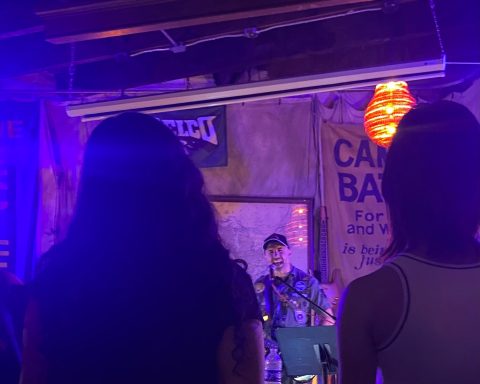Your brain is a mesh of complication — a mess of information forming microscopic three-staged structures that fold in a specific way to create long, weaving bodies that don’t really ever touch each other but still send electrical signals that control your every movement, breath and thought.
It is a tangle of electrical signals called action potentials that send positive or negative signals and are controlled by little channels in the brain made by a selective sieve that serves as a gatekeeper for molecular organelles. It’s a chaotic swirl of these action potentials which then, with their positive or negative signal, form little puzzle pieces that float across the gap between the bodies and latch on to their matching puzzle piece on the other end. Only then do they release another action potential, another puzzle piece, another latch on and once again, another action potential.
Your brain is a mesh of complication, and with a complication as big as this one, it is inevitable that mistakes — sometimes vital ones — occur. In these mistakes lies the basis of mental disorders: perhaps too few puzzle pieces cross the gap, perhaps incorrect positive or negative signals are released, perhaps the channels don’t open up as they are supposed to. Mental disorders form in those moments of disruption that the chaotic logic our grey matter follows.
For a while now, I have obsessed over the brain and its abnormalities. I’ve learned about when and why and where the channels open and close. I’ve wondered about the different puzzle pieces: GABA and dopamine and serotonin and how they affect the brain. I’ve amazed over the complex transfer of information or touch, sound, smell bursting through neurons rapidly and, most importantly, I’ve fallen in love with action potentials—intricate, essential and sprouting just as I press my fingers against the keys to type this.
However, falling in love has its drawbacks, and falling in love with action potentials made me hyper-aware of every thought that floated across my brain. It helped me realize that my brain fell short of reaching its potential because of dysfunctional parts that stopped its action. Falling in love with action potentials made me prepared to plunge face first, eyes shut into recovery.
Depression and anxiety have plagued me for a long time now, and with time and hard work, my mental health has been improving. I have swallowed SSRI after SSRI, made psychotherapy my religion and self-care my God. I have obsessed over making sure my neurons were working like they were meant to be. I have even considered deferring college for a year to mend all the self-hate that infested my brain.
But, I was so enthralled by Swarthmore that my heart wouldn’t let me wait another year to jump into college. Instead, I decided to engulf myself in all the mental health care resources Swarthmore provides.
In the midst of the bustle of orientation week, I made my first appointment with CAPS, fingers shaking as I filled in the relatively easy form — I was determined to be in control of my mental health so I could focus on friends, academics and clubs. Classes began in a swirl of busy upperclassmen, expensive textbooks and fast-paced lectures that made clear note-taking close to impossible. The significant stench of stress was already in the air. On my first day of classes, I spent hours in McCabe (not really sure how productive I was truly being, considering it was only day one and then headed off to Worth Health Center for my first appointment with a counsellor.
Admittedly, my first time in CAPS was a little intimidating, I didn’t know what to do — whether to check in, knock, or just wait for someone to come get me—but, as my counsellor welcomed me into the room, I felt myself release a breath I didn’t know I was holding. I’m not sure if it was the cosy room or the soft couch, but I instantly felt comfortable opening up about the happenings of my brain. The initial session was around 45 minutes long and we talked about my situation, why I decided to come to CAPS and what I hoped to get out of the session. I felt so at ease that I found myself vomiting all my worries out without hesitation or the fear of being judged — something I never felt in past therapy sessions back home. The conversation made me feel like I could not only tackle the rest of the week, but conquer it. I made an appointment on the way out of the door.
My first week of classes was good — I felt productive, inspired and ready to embrace all the new experiences that were hurled at me. For a couple of days, all my worries during international and all-school orientation subsided, so I could focus on expanding myself — I let my creativity run wild in new poems. I made new friends and I soaked up the information in class. Then, the thing I feared most happened — I relapsed into self-harm. It happened so fast that I didn’t have the opportunity to rethink my decisions — I woke up in the morning with a weight on my chest and a mission to return to CAPS to stop myself before I felt worse.
Walking into Worth after a rough day was exponentially hard, but to my surprise — I found just what I needed. Izzy, a fluffy therapy poodle stood waiting there for me. As I petted her soft fur, she curled into my legs, pushing her back against me. I suddenly felt a soft calmness spread around me. I spent half an hour, sitting on the floor of Worth, petting Izzy who seemed to love being scratched. Playing with Izzy was so simple but it gave me a break to think and assess my situation while indulging in her adorableness. For those thirty minutes I only focused on her soft fur between my fingers, how she looked like a fuzzy rug when she flopped on the floor, and how she looked up at me, begging me to pet her everytime I stopped. It was relaxing and a needed break in my stressful day.
My first two weeks in Swarthmore have been a rollercoaster of emotion, but I’m so thankful for the resources that I have found, and others I may find in the future. It’s comforting to know that I have a support system in the paws of CAPS to fall on when my neurons refuse to carry out the action in the potential I know they have.













